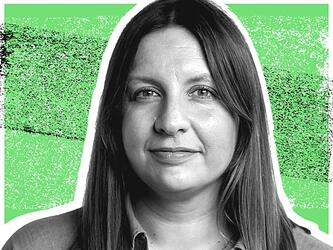The market research industry: ‘horribly white and middle class'?
Ettie Etela and Jo Rigby
That was a topic for debate today at the MRS Conference, where Jo Rigby, insight consultant, chaired a session on ideas for championing inclusivity in research and marketing.
“Diversity is distinct from equality,” she pointed out. “The two are often bedfellows, but diversity is more than just tolerance; it’s a positive pull towards difference.”
An audience member described the research industry as a “horribly white middle class industry, despite the fact qualitative research is about getting people’s points of view”, while Belinda Parmar, CEO of Lady Geek and founder of Little Miss Geek, told the crowd that, in her view, and in the companies she sees day-to-day, evidence of diversity is “pretty limited” – often despite proud claims to have “updated the maternity policy”. Parmer added that “true” diversity often comes from a visionary in an organisation.
“Britain’s population is now 55% non-white British,” said Sam Phillips, CMO, Omnicom, and CEO of OMG Ethnic. “I don’t see that in marketing and advertising.”
“Where are the role models?,” she asked, adding that, while many organisations are having conversations around gender, disability is an issue that she thinks few have tackled.
She points to recent campaigns by retailer Marks & Spencer which use models of different ethnicities, a child with Down’s syndrome, and a disfigured model. “I’ve no idea if it’s reflected internally, but at least it’s there even if only on a conscious level,” she said.
Ettie Etela, associate director at Nielsen NRG, pointed to social media as a ‘great leveller’. “Those that get it right tend to embrace these channels,” she said. “it gives them a diverse energy.”
Employment practices were also discussed, with chair Jo Rigby calling for an increase in apprenticeships. Nielsen’s Etela added, “People tend to employ people who are a little bit like them. In fact people different to you can be more valuable.”

We hope you enjoyed this article.
Research Live is published by MRS.
The Market Research Society (MRS) exists to promote and protect the research sector, showcasing how research delivers impact for businesses and government.
Members of MRS enjoy many benefits including tailoured policy guidance, discounts on training and conferences, and access to member-only content.
For example, there's an archive of winning case studies from over a decade of MRS Awards.
Find out more about the benefits of joining MRS here.













10 Comments
Anon
11 years ago
Not exactly surprised. I'm an Asian graduate with pretty good credentials, and I've been trying to enter the market research industry in the UK (If you want to learn the industry, I think the UK has the most companies at the forefront), but no one wants to sponsor a work visa :(.
Like Reply Report
Tom H. C. Anderson
11 years ago
'horribly white and middle class' In comparison to what other professions? Interesting that gender didn't come up... Everything is relative. Surprised researchers don't consider things in context
Like Reply Report
Jay Owens
11 years ago
Stats check - 2011 census reports the UK as 80.5% white British, and 86.0% white. (http://www.ons.gov.uk/ons/rel/census/2011-census/key-statistics-for-local-authorities-in-england-and-wales/rpt-ethnicity.html) It's just London that's 45% white British: (http://www.bbc.com/news/uk-england-london-20680565). That said, the points about the industry's diversity still hold. A few other factors: 1) To what extent are unpaid internships still a big part of how people get started in research? 2) Lack of professional stature - if you're the first in your family to go to university (often the case for people from working class and/or minority ethnic backgrounds), people tend to look towards solid, reliable, established careers with fairly high earnings potential (medicine, law, accountancy etc). Market research isn't one of these. 3) Do any big research firms do diversity focused recruitment efforts, e.g. at universities with more working class or BME students (London South Bank, Queen Mary's etc)? Or by reaching out to specific student societies? 4) Is their client interest in diversifying? Or are their segmentation models typtically very narrow and normative - assuming all "busy mums" to be white, and not bringing in diversity as an issue for insight at all. While US marketers are coming to see the need to connect with Hispanic and African-American audiences, UK marketing seems some way behind.
Like Reply Report
Anon
11 years ago
Coming back to the anonymous commenter re sponsorship of visas. This is a very difficult area as there are numerous legal requirements around sponsorship meaning only the largest of companies are financially able to take that risk, and fewer of those are actually willing. Most companies in order to sponsor need to show that the skills required do not exist in the wider EU, or that the post has been widely advertised for a long time (normally 6 months) without success. Combined with the reduction of visas actually being issued it does make it very difficult for companies to see this as a viable route. You may be best to join an international company overseas and see if you can transfer internally.
Like Reply Report
Cameron Cramer
11 years ago
The headline pulled me in. I agree with Tom as far as putting things in context. I believe the industry may be “horribly” aging as well. When working on the corporate or supplier side of market research, a popular game is guessing others Bachelor’s Degree because they were an eclectic mix of arts and sciences. Many people fell naturally into MR as a profession several years back. The new generation of analytically minded talent is not falling into traditional MR anymore. There is no doubt that social media analytics, pay-per-click, search optimization and web analytics are siphoning off much of the diverse and analytically minded young talent because there are so many more jobs available in that space. I can name dozens of young colleagues and friends who have made such decisions. Do a search on your favorite job board for junior level research and analytics job titles and you’ll see that MR has significantly less openings, especially at the lower levers. Compounding the issue is that newer grads can earn much more money in much less time via other analytics career paths compared to MR. Compounding things even further, since social and web analytics are so desperate for talent, Fortune 500 and large interactive analytics agencies are offering lots of incredible internship opportunities that quickly lead to well paid jobs. So the question is, if the MR industry is “horribly which and middle class,” how do you change the future?
Like Reply Report
Jim Lee
11 years ago
Interesting - Was stunned to read this, and then recovered when I realised you were only talking about Britain. Would be interesting to see how different markets have changed and not just britain. South East Asia and the Middle East used to be the place where the good ole Brit researchers liked to hang out and this trend slowly declined, and these are now proudly multi-racial and to some extent 'bangalored' with more Indians, Philipinas and Indonesians joining in. Do step outside Britain, once in a while, at least in your webpages!
Like Reply Report
Tom Ewing
11 years ago
I was at the panel - the conference's only all-woman one, I believe! - worth correcting a couple of points @Tom - gender came up a lot, actually - in fact it was a main point of discussion. The "horribly white and middle-class" comment came from a (male) audience member so while it's a good headline (and was a useful intervention) it's not really a fair representation of the overall tone. @Jay - yes, the speaker said London, this is a write-up error not a panelist error (if my notes are right!). There was a good conversation about the obsession with university entrants (indeed Oxbridge qualifications specifically) sparked by Louise Brice pointing out that university requirements are probably the main diversity barrier in the industry. @Jim - Yes, the UK focus distorts the picture in terms of ethnicity but a) as above, this was a comment from the floor not representative of the panel as a whole, b) it would be interesting to see how ethnicity and seniority are related even in 'emerging markets' (I genuinely don't know) and c) don't you think the 'middle class' comment is still applicable?
Like Reply Report
Ray Poiynter
11 years ago
All it takes for an industry to, in effect, be racist, is for its recruitment to favour accidental entrants. If a large proportion of an industry fall into it, because a friend works in it, or because a neighbour runs a field company, or an aunt is the manager of a research unit, then that industry will stay stuck in the past. The answer to this problem, like the answer to many other MR related problems, is for the industry to raise its profile so that more people want to join it.
Like Reply Report
Ray Poynter
11 years ago
Also, Editor, it would make sense to correct the 55% in the text of the article to show the 45% is a London figure for British White, not a national figure - as it would appear that is a reporting error, not a mistake that was made at the meeting? The article could be cited without the comments.
Like Reply Report
Annie Pettit
11 years ago
Perhaps we are taking baby steps. Over the the last few years, I do think we have progressed on the gender front. Perhaps it's still not where it ought to be but we are on the right path. Other types of diversity will follow, maybe not as quickly as we like, but they will follow. And if careers like analytics are showing more diversity, do remember that analytics IS INDEED market research by another name. Let's not shoot ourselves in the foot because people want cooler sounding job titles. Sincerely, Consumer Insight and Big Data Analyst
Like Reply Report